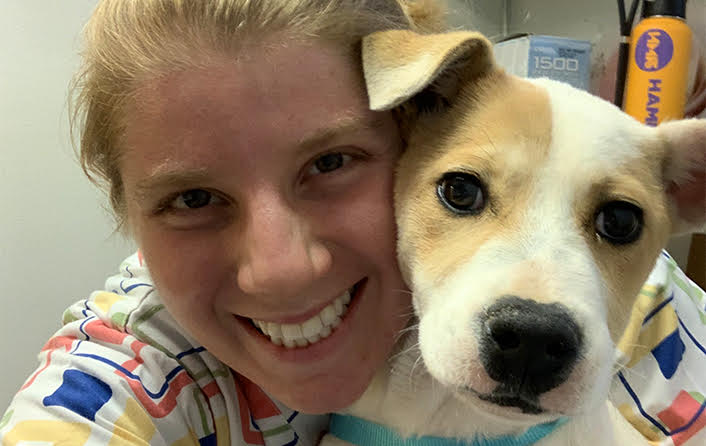
-
- Posted Wednesday March 10, 2021
TGen seeks help from Arizona dog and cat owners for COVID-19 study
Project builds on ‘One Health’ testing and disease surveillance collaborations in Arizona
PHOENIX, Ariz. — March 10, 2021 — The Translational Genomics Research Institute (TGen), an affiliate of City of Hope, announced today the start a new scientific study: Testing pets of those Arizonans who have contracted COVID-19.
No pets will be harmed during this study as all sample collections will be performed by trained veterinary staff. Among the more than 120 pets that have tested positive nationwide, there is no evidence suggesting that pets can spread the virus to humans.
TGen received a grant from the Arizona Department of Health Services (ADHS) to conduct a pilot study to investigate SARS-CoV-2, the virus that causes COVID-19, in animals. The funds come from the U.S. Centers for Disease Control and Prevention (CDC) and from the Council of State and Territorial Epidemiologists (CSTE).
So far, four pets — two dogs, and two cats —have tested positive for COVID-19 in Arizona.
“We want to better understand the risk factors leading to any form of COVID-19 transmission between humans and animals,” said Hayley Yaglom, a genomic epidemiologist and lead TGen investigator on the study.
Eligibility for testing pets
Dog and cat owners who have tested positive for COVID-19 within the past two weeks are eligible to participate in the study. The tests are free. Owners must be at least 18, provide consent and fill out a questionnaire. The pet must be vaccinated against rabies, mainly housed indoors, and tolerant of the handling and restraint necessary for routine veterinary care.
Project staff, accompanied by a veterinarian, will visit the households of qualifying pet owners to collect nasal, fecal and blood samples.
Tests for the presence of the COVID-19 virus, or antibodies against the disease, will be conducted by TGen, which has provided human testing and genomic sequencing of positive COVID-19 samples since the pandemic began in early 2020.
Pet owners must wear masks during sample collection, and project staff will wear masks and gloves. Spanish-speaking staff will be available, as needed. Pet owners will be notified of test results within 3-4 weeks. For pets that test positive, owners may be asked to enable collection of additional samples. Positive tests will be reported to the Arizona State Veterinarian and ADHS.
Expanding TGen’s One Health initiative
This pilot project comes under the umbrella of TGen’s One Health Collaborative, an initiative begun by TGen in 2018 to integrate research findings and create a holistic view of human, animal and environmental health, according to David Engelthaler, Ph.D., head of TGen’s infectious disease studies.
“In addition to conducting surveillance for the COVID-19 virus in companion animals,” Dr. Engelthaler said, “our work also aims to develop a response plan among One Health collaborators, highlighting best practices and how to effectively integrate SARS-CoV-2 and other animal and human pathogen surveillance into established systems.”
For more information about testing pet dogs or cats for COVID-19, please send questions to: [email protected].
# # #
About TGen, an affiliate of City of Hope
Translational Genomics Research Institute (TGen) is a Phoenix, Arizona-based nonprofit organization dedicated to conducting groundbreaking research with life-changing results. TGen is affiliated with City of Hope, a world-renowned independent research and treatment center for cancer, diabetes and other life-threatening diseases: CityofHope.org. This precision medicine affiliation enables both institutes to complement each other in research and patient care, with City of Hope providing a significant clinical setting to advance scientific discoveries made by TGen. TGen is focused on helping patients with neurological disorders, cancer, diabetes and infectious diseases through cutting-edge translational research (the process of rapidly moving research toward patient benefit). TGen physicians and scientists work to unravel the genetic components of both common and complex rare diseases in adults and children. Working with collaborators in the scientific and medical communities worldwide, TGen makes a substantial contribution to help our patients through efficiency and effectiveness of the translational process. For more information, visit: tgen.org. Follow TGen on Facebook, LinkedIn and Twitter @TGen.
Media Contact:
Steve Yozwiak
TGen Senior Science Writer
602-343-8704
[email protected]


